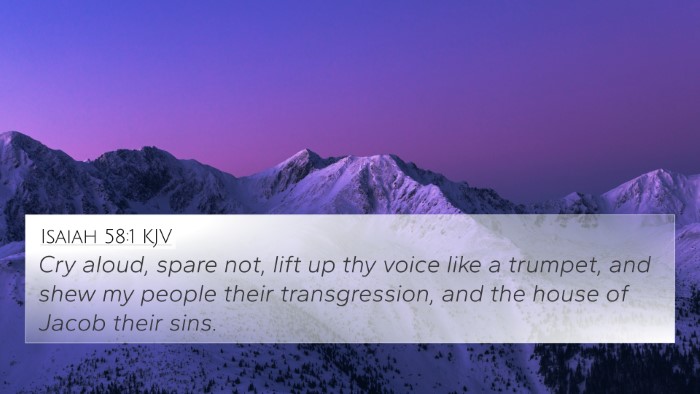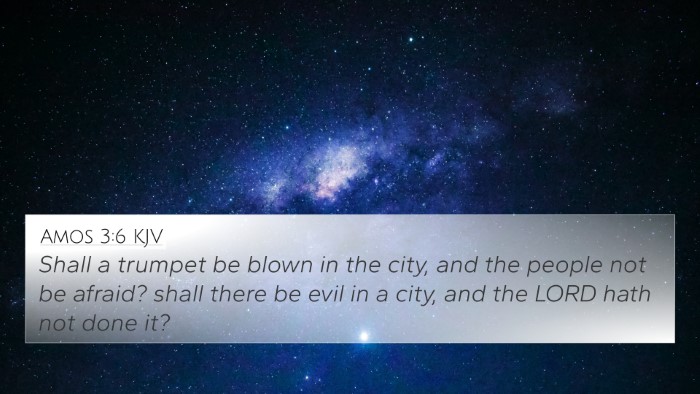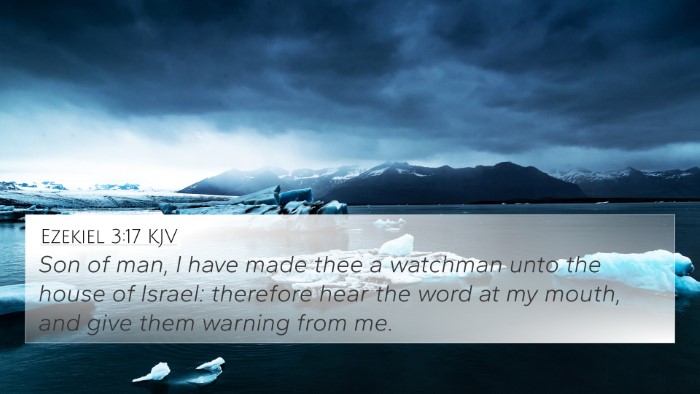Understanding Jeremiah 6:17
Verse: "Also I set watchmen over you, saying, Hearken to the sound of the trumpet. But they said, We will not hearken." (Jeremiah 6:17, KJV)
Summary of Meaning
The passage from Jeremiah illustrates the dire situation in Judah during the time of the prophet. God, through Jeremiah, appointed watchmen—prophets and leaders—to warn the people of impending danger due to their rebellion and disobedience. However, the people's response reflects their stubbornness and unwillingness to heed God’s messages.
Commentary Insights
-
Matthew Henry:
Henry emphasizes the role of watchmen as critical figures in spiritual governance. They are tasked with warning the people against complacency and sin. The people’s refusal to listen signifies a deeper spiritual malaise—a lack of true understanding of the consequences of their actions.
-
Albert Barnes:
Barnes highlights the significance of the trumpet, which serves as a call to attention and a warning. The refusal of the people to heed the watchmen indicates a rejection not only of the prophets but of God’s authority. This rebellion leads to dire consequences, as refusal to listen to the warning can result in destruction.
-
Adam Clarke:
Clarke discusses the metaphor of watchmen in the context of prophetic responsibility. He notes that the act of not hearkening to the trumpet sound illustrates a profound disregard for divine counsel, which markedly contrasts with the expectation of righteousness that God has for His people.
Cross-References
Jeremiah 6:17 connects to various other scriptures that reflect similar themes:
- Ezekiel 3:17-21: The prophet as a watchman with the responsibility to warn the wicked.
- Isaiah 58:1: A call to sound the trumpet and warn the people.
- Matthew 23:37: Jesus laments over Jerusalem, highlighting the rejection of prophets.
- Hebrews 3:15: Today, if you hear His voice, do not harden your hearts as in the rebellion.
- Proverbs 1:24-25: The call of wisdom to heed her voice, despite rejection.
- Revelation 3:20: Christ’s plea to the church to open the door and hear His voice.
- Lamentations 2:9: The prophets are not heard, showcasing the people’s disobedience.
Thematic Connections
This verse is part of a larger theme seen throughout Scripture regarding watchmen and the consequences of rejecting divine guidance, presenting an ongoing dialogue about accountability before God.
Interpretation and Application
-
Spiritual Vigilance:
Like the watchmen, individuals today are called to be vigilant in their spiritual lives, aware of the dangers of sin and complacency.
-
Heeding Warnings:
Jeremiah 6:17 implores believers to listen to God's word and direction, as neglecting these teachings can lead to dire spiritual consequences.
-
The Role of Prophets:
The rejection of prophetic voices reflects a broader spiritual apathy that can still be observed. Modern believers must discern and acknowledge God’s messengers.
Further Reflections
Engaging with this verse invites Christians to self-reflect on their responsiveness to God's guidance. Are they actively listening for His voice through scripture and spiritual leaders? Or have they become apathetic, much like the people in Jeremiah's time?
Conclusion
Jeremiah 6:17 serves as a poignant reminder of the importance of vigilance and responsiveness to spiritual warnings. As one explores the connections between Bible verses, the implications of this warning resonate not only historically but also in contemporary faith practice, underscoring the timeless nature of God’s call to repentance and attentiveness.














